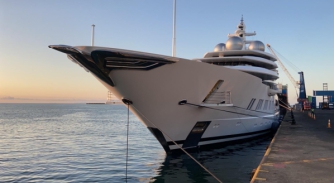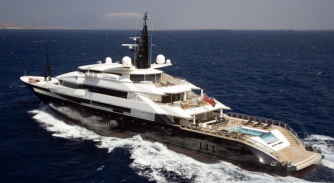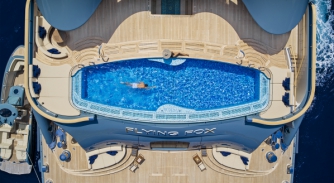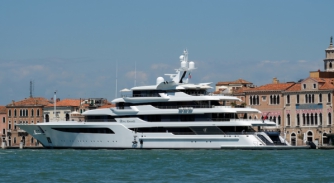Can frozen yachts be thawed?
Sanctioned yachts have been locked in limbo for years, but could a new legal mechanism allow legitimate sales? …
Frozen assets have become a real issue in yachting over the past few years. High-profile seizures have made headlines and millions have been spent out of the public purse maintaining vessels that can’t move, let alone be sold, and not necessarily for lack of trying. So, what if there was a way sanctioned owners could, in fact, release their vessels back into the fleet while still respecting the legal restrictions in place?
Industry veteran Russell Crump, Senior Broker at brokerage Thompson of Monaco, believes he’s found a solution. Speaking with SuperyachtNews, Crump revealed he’s been working with legal teams in London and New York on a framework designed to release yachts currently blocked by geopolitical sanctions.
Crump’s play is a straightforward legal mechanism at its core, although it will take a team of highly skilled lawyers to navigate the regulatory labyrinth to make it a reality. But it is a mechanism that would allow for the legitimate sale of sanctioned yachts, provided strict conditions are met. All that is needed is a willing seller, a motivated buyer and a clean title.
While Crump couldn’t disclose specific details due to strict NDAs, he confirmed that the framework is already being applied to a live case in Europe, potentially marking the first sanctioned sale of its kind.
“From a legal standpoint, the US Office of Foreign Asset Control (OFAC) has already agreed to the proposal verbally. They know this can’t go on forever,” he explains. “When you really dissect the sanctions against the oligarchs, it’s clear they weren’t thought through properly. They were knee-jerk reactions.
“But more to the point, no one from the yachting industry stood up to governments when it counted. We should have lobbied harder. Because honestly, it was obvious no one involved in those decisions understood the nuance or the ripple effect this would have on our sector. If you think about everyone that a 100-metre yacht touches, it’ is the size of a small town. Now, these towns are under siege.”
Crucially, it’s not about sidestepping regulation but about providing a structured, transparent route out of limbo for the yachts and the people working on board. “This isn’t a workaround. It’s a resolution,” he says. “These yachts are stuck. We’re offering a way to unstick them, all while saving public money spent on the vessels’ maintenance.”
We’ve already seen the impact of high-profile vessels caught in legal stasis. Amadea, Alfa Nero and Phi have become household names for the wrong reasons surrounding the drawn-out battles over their fate. This legal limbo’s financial and reputational cost continues to mount.
Crump’s model proposes that ownership can be transferred through a legally compliant process. Here’s how it would work in practice:
• A buyer and seller are identified – the seller being the current (sanctioned) owner of the yacht and the buyer willing to purchase under strict legal oversight.
• The sale is approved – by the relevant authorities (including OFAC) based on complete transparency of all parties involved, the origin of funds, and the end use of the vessel.
• The funds are held in escrow – the seller doesn’t receive a penny. The money sits in a controlled account until the seller can legally access it.
• The yacht is transferred to the buyer – the vessel is issued a clean legal title, unencumbered by the previous ownership status.
• The yacht re-enters the market – maintained, operated and used by the new owner without political or financial restrictions.
The funds from any sale would be held in escrow and managed by OFAC or the relevant sovereign authority. In principle, the same process would apply across different jurisdictions, with the appropriate body holding the funds until sanctions are lifted or revised.
Only buyers who pass rigorous compliance checks – and receive approval from OFAC or the applicable authority – would be eligible. Ultimate beneficial ownership, source of funds, and future use of the vessel would all be scrutinised.
Crump’s framework assumes any such sale would require full sign-off from the relevant authorities. That includes OFAC and verification of transparency, source of funds and ultimate beneficial owner (UBO).
The goal is to move the conversation away from frozen assets and legal paralysis toward economic recovery. It would also ease the burden on governments footing the bill for upkeep and crewing on vessels they can neither use nor dispose of.
It’s also a sign that the market needs a longer-term view. Sanctions are often reactive, but the fallout lingers. These yachts are multi-million-euro operations with crew, insurance, maintenance and holding costs. Leave them idle long enough, and they move from being a financial liability to an environmental one.
“If we’re serious about sustainability, this applies as much to financial waste as it does to environmental concerns,” Crump added. “Letting these assets rot is bad business for everyone.”
However, the proposal also raises unavoidable ethical questions. Not because the concept is flawed but because of the uncertainty around implementation. If a sanctioned asset can be sold and operated under a new owner, with funds being held in escrow for the sanctioned seller, even with full regulatory approval, does that dilute the very point of sanctions?
“Not at all. This is about preserving these assets, so they don’t become a liability,” Crump argues. “If you leave a yacht inactive too long without proper services, it becomes a financial waste and a serious environmental risk. We’re talking about millions in potential damage and clean-up. That’s not what sanctions were meant to achieve.”
“There’s no indication when sanctions will be lifted. It could be years,” he adds. “By that point, the damage will be done. It’s better to free them now, get them back into operational use and let the funds sit in escrow until it’s legally appropriate to release them.”
What happens if the owner never becomes eligible to receive the funds remains unclear and could become a legal and ethical quagmire. In theory, governments could retain the funds indefinitely if sanctions are never lifted. Whether interest accrues or if it could be claimed later is also unknown and depends on future case law.
What is certain is that this will catch the attention of not only our industry but the wider world. The framework could unlock a significant portion of stalled capital and create a precedent for how frozen assets in our sector and beyond are treated going forward. Once the first deal has closed, there is no reason more won’t follow.
Of course, there are risks. But in an increasingly volatile landscape, it’s not unthinkable that certain sanctions may ease. Some may even be lifted altogether. When that day comes, the industry would be wise to have a structure to deal with what comes next, not just react to what’s already happened.
Thumbnail home page image: Alfa Nero, courtesy of Oceanco
NEW: Sign up for SuperyachtNewsweek!
Get the latest weekly news, in-depth reports, intelligence, and strategic insights, delivered directly from The Superyacht Group's editors and market analysts.
Stay at the forefront of the superyacht industry with SuperyachtNewsweek
Click here to become part of The Superyacht Group community, and join us in our mission to make this industry accessible to all, and prosperous for the long-term. We are offering access to the superyacht industry’s most comprehensive and longstanding archive of business-critical information, as well as a comprehensive, real-time superyacht fleet database, for just £10 per month, because we are One Industry with One Mission. Sign up here.
Related news

What’s next for Amadea?
The recent ruling may have provided some clarity on the UBO, but what happens now in a complex political climate offers more questions than answers
Opinion
.jpeg)
No win, no Phi
Phi is but a “pawn of policy”, heard Supreme Court judges, while Captain Guy Booth discusses the next steps for the stranded superyacht
Fleet

Alfa Nero crew to receive six-figure payout
Crew of the previously sanctioned yacht are set to receive hundreds of thousands of pounds in unpaid wages, with Nautilus looking to secure even more
Crew

Flying Fox freed from sanctions
Sanctions on the world’s largest charter yacht have officially been lifted, allowing the vessel to re-enter the market without limitations
Fleet

Ukraine to lose ownership of Royal Romance
Royal Romance may be returned to its original owner if legal issues aren’t resolved swiftly
Fleet
Related news
What’s next for Amadea?
11 months ago
No win, no Phi
1 year ago
Alfa Nero crew to receive six-figure payout
1 year ago
Flying Fox freed from sanctions
1 year ago
Ukraine to lose ownership of Royal Romance
2 years ago
NEW: Sign up for
SuperyachtNewsweek!
Get the latest weekly news, in-depth reports, intelligence, and strategic insights, delivered directly from The Superyacht Group's editors and market analysts.
Stay at the forefront of the superyacht industry with SuperyachtNewsweek



